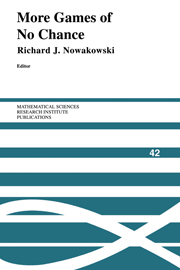Book contents
- Frontmatter
- Contents
- Preface
- The Big Picture
- Idempotents Among Partisan Games
- On the Lattice Structure of Finite Games
- More Infinite Games
- Alpha-Beta Pruning Under Partial Orders
- The Abstract Structure of the Group of Games
- The Old Classics
- Higher Nimbers in Pawn Endgames on Large Chessboards
- Restoring Fairness to Dukego
- Go Thermography: The 4/21/98 Jiang-Rui Endgame
- An Application of Mathematical Game Theory to Go Endgames: Some Width-Two-Entrance Rooms With and Without Kos
- Go Endgames Are PSPACE-Hard
- Global Threats in Combinatorial Games: A Computation Model with Applications to Chess Endgames
- The Game of Hex: The Hierarchical Approach
- Hypercube Tic-Tac-Toe
- Transfinite Chomp
- A Memory Efficient Retrograde Algorithm and Its Application to Chinese Chess Endgames
- The New Classics
- The 4G4G4G4G4 Problems and Solutions
- Experiments in Computer Amazons
- Exhaustive Search in Amazons
- Two-Player Games on Cellular Automata
- Who Wins Domineering on Rectangular Boards?
- Forcing Your Opponent to Stay in Control of a Loony Dot-and-Boxes Endgame
- 1 x n Konane: A Summary of Results
- 1-Dimensional Peg Solitaire, and Duotaire
- Phutball Endgames Are Hard
- One-Dimensional Phutball
- A Symmetric Strategy in Graph Avoidance Games
- A Simple FSM-Based Proof of the Additive Periodicity of the Sprague-Grundy Function of Wythoff's Game
- Puzzles and Life
- The Complexity of Clickomania
- Coin-Moving Puzzles
- Searching for Spaceships
- Surveys
- Unsolved Problems in Combinatorial Game Theory: Updated
- Combinatorial Games: Selected Bibliography With A Succinct Gourmet Introduction
Go Endgames Are PSPACE-Hard
Published online by Cambridge University Press: 29 May 2025
- Frontmatter
- Contents
- Preface
- The Big Picture
- Idempotents Among Partisan Games
- On the Lattice Structure of Finite Games
- More Infinite Games
- Alpha-Beta Pruning Under Partial Orders
- The Abstract Structure of the Group of Games
- The Old Classics
- Higher Nimbers in Pawn Endgames on Large Chessboards
- Restoring Fairness to Dukego
- Go Thermography: The 4/21/98 Jiang-Rui Endgame
- An Application of Mathematical Game Theory to Go Endgames: Some Width-Two-Entrance Rooms With and Without Kos
- Go Endgames Are PSPACE-Hard
- Global Threats in Combinatorial Games: A Computation Model with Applications to Chess Endgames
- The Game of Hex: The Hierarchical Approach
- Hypercube Tic-Tac-Toe
- Transfinite Chomp
- A Memory Efficient Retrograde Algorithm and Its Application to Chinese Chess Endgames
- The New Classics
- The 4G4G4G4G4 Problems and Solutions
- Experiments in Computer Amazons
- Exhaustive Search in Amazons
- Two-Player Games on Cellular Automata
- Who Wins Domineering on Rectangular Boards?
- Forcing Your Opponent to Stay in Control of a Loony Dot-and-Boxes Endgame
- 1 x n Konane: A Summary of Results
- 1-Dimensional Peg Solitaire, and Duotaire
- Phutball Endgames Are Hard
- One-Dimensional Phutball
- A Symmetric Strategy in Graph Avoidance Games
- A Simple FSM-Based Proof of the Additive Periodicity of the Sprague-Grundy Function of Wythoff's Game
- Puzzles and Life
- The Complexity of Clickomania
- Coin-Moving Puzzles
- Searching for Spaceships
- Surveys
- Unsolved Problems in Combinatorial Game Theory: Updated
- Combinatorial Games: Selected Bibliography With A Succinct Gourmet Introduction
Summary
ABSTRACT. In a Go endgame, each local area of play has a polynomial size canonical game tree and is insulated from all other local areas by live stones. Using techniques from combinatorial game theory, we prove that the Go endgame is PSPACE-hard.
1. Introduction
Go is an ancient game which has been played for several millennia throughout Asia. Although playable rules are relatively simple (tournament rules can include many technicalities), the game is strategically very challenging. Go is replacing Chess as the pure strategy game of choice to serve as a test-bed for artificial intelligence ideas [9] [7] [6].
Go was proved PSPACE-hard by Lichtenstein and Sipser [8], and was later proved EXPTIME-complete (Japanese rules) by Robson [12]. More recently, Crâşmaru and Tromp [5] proved that Go positions called ladders are PSPACE-complete. Yedwab conjectured that the Go endgame is hard [14]. The endgame occurs when each local area of play has a polynomial size canonical game tree and is insulated from all other local areas by live stones. A combinatorial game theorist will recognize this as a sum of simple local positions.
Morris succeeded in proving that sums of small local game trees are PSPACE-complete [11]. Yedwab restricted the games to be of depth 2 [14], and Moews showed that sums of games with only three branches are NP-hard [10] [1, p. 109]. (Each of Moew's games is of the form {a || b | c} where a, b and c are integers.) Since Yedwab's and Moews’ Go-like game trees depend upon scores which are exponential in magnitude (yet polynomial in the number of bits of the scores), they did not translate to polynomial sized Go positions.
Berlekamp and Wolfe show how to analyze certain one-point Go endgames [1], Some of these endgame positions have values which are linearly related to dyadic rationals of the form. Since these endgame positions are polynomial in size in the number of bits of the numerator and denominator of x, their techniques can be combined with those of Yedwab and Moews to prove that the Go endgame is PSPACE-hard.
Robson observed that in Japanese rules (where repetitions of a recent position are forbidden), Go is easily seen to be in EXPTIME. However, he conjectures that according to Chinese rules (where any previous position is forbidden), Go is EXPSPACE-complete [13]. This paper fails to resolve his conjecture, but the techniques may be applicable.
Information
- Type
- Chapter
- Information
- More Games of No Chance , pp. 125 - 136Publisher: Cambridge University PressPrint publication year: 2002
